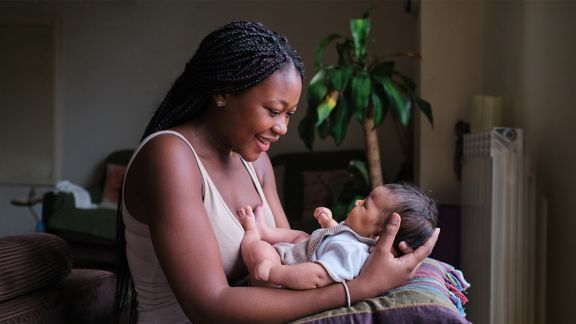AI Is Changing How Americans Access Health Information—But Many Remain Skeptical
Author
Director of NORC’s Center for Health Communication Science
Center for Health Communication Science
Developing and evaluating tailored communications to address today’s most critical health issues.
November 2025
New NORC data reveal uneven awareness, growing curiosity, and persistent trust gaps in how U.S. adults use artificial intelligence for health information.
Artificial intelligence (AI) is reshaping how Americans find and interpret health information—yet many remain uncertain about what it is and whether to trust it. New data from NORC’s AmeriSpeak® Omnibus survey show that about a quarter of U.S. adults have already turned to AI to get health information. But large segments of the public have barely heard of these tools, and even fewer fully trust them. These findings reveal a nation divided between early adopters and skeptics, with deep differences by age, education, income, and race.
Uneven Awareness
Many Americans still know little or nothing about AI in health.
About half of U.S. adults say they know little or nothing about how AI is used to create and share health information. Eighteen percent say they know nothing at all, and one-third know only a little—highlighting a significant awareness gap as AI becomes more embedded in daily life.
Awareness is highest among adults with higher levels of education and income, revealing a knowledge divide that may shape how quickly different groups engage with AI-driven health tools. For example, 89 percent of adults with a college degree know at least something about AI compared to 73 percent of those with a high school diploma or less.

Growing Use & Interest
About half of adults have used, or are open to using, AI for health.
Overall, 27 percent of U.S. adults report having used AI at least once to get health information and another 24 percent say they might use it in the future. Together, that’s about half of Americans who have either used AI or are open to doing so, signaling early but meaningful adoption of these tools.
Who’s Using It?
Early adopters tend to be younger, higher-income, and more educated.
AI use for health information is concentrated among younger and more affluent adults. Those with higher income and education levels are more likely to have tried AI, while adults with lower education are more likely to say they have not used it and do not plan to.
Adults ages 18-59 are more likely than adults 60 and older to have used AI to get health information at least once before. Among adults 45 and older, nearly three in 10 say they might use AI in the future. However, more than three in 10 adults ages 18-45 and four in 10 older adults ages 60+ say they haven’t used AI for health information and do not plan to do so, suggesting that skepticism toward AI may bridge generational divides.

The Trust Landscape
Health care providers remain most trusted—but AI is gaining ground.
When it comes to trust, most Americans continue to rely on sources such as health care providers and public health agencies compared to AI.
However, one in five U.S. adults trust AI health information about the same as information from family, friends, or their employers. Nearly half of adults say they trust AI-generated health information about the same or more than what they see on social media, and about four in 10 say the same about traditional media sources like television or radio. Adults with higher education and income levels are more likely to trust AI over social media and traditional media compared to those with lower education and income levels.
Notably, six percent of respondents reported trusting AI more than their own health care provider for health information, while another 15 percent trust AI just as much as their provider. Although these percentages are small, they are worth watching closely as AI becomes increasingly integrated into daily life.

Building Trust
Transparency, privacy, and expert endorsement could close the gap.
Roughly half of U.S. adults say their confidence in AI-generated health information would increase if it included clear sourcing. Four in 10 say that allowing comparison with other information or offering strong privacy protections would increase their confidence. One-third, however, say that nothing would make them more confident in AI health information.

“These findings show that AI is quickly becoming a part of Americans’ health information landscape, but awareness and trust are far from uniform,” said Amelia Burke-Garcia, director of NORC’s Health Communication AI initiative. “While many adults are experimenting with AI tools, a substantial portion of the population remains unfamiliar or skeptical. Understanding these gaps—and what drives trust—will be critical as AI continues to shape how people make decisions about their health.”
AI is already changing how Americans seek and share health information. While many adults remain uncertain or skeptical, curiosity is driving growing experimentation and use. As AI technologies continue to evolve, understanding who uses them, who trusts them, and what could build confidence will be key to shaping a future where AI complements—not competes with—other trusted sources of health information.
Methodology
A poll of American adults was conducted between October 9 and October 13, 2025, during an AmeriSpeak monthly Omnibus survey. It included 1,096 interviews with a nationally representative sample (margin of error +/- 4.1 percentage points) from the AmeriSpeak Panel, NORC’s probability-based panel that is designed to be representative of the U.S. household population. A comprehensive listing of all study questions and tabulations of top-level results for each question is available below.
About the NORC Spotlight on Health
NORC at the University of Chicago’s Spotlight on Health is a series of quick-hitting national surveys and analyses on issues vital to health and well-being, conducted using AmeriSpeak’s probability-based panels.
About NORC at the University of Chicago
NORC at the University of Chicago conducts research and analysis that decision-makers trust. As a nonpartisan research organization and a pioneer in measuring and understanding the world, we have studied almost every aspect of the human experience and every major news event for more than eight decades. Today, we partner with government, corporate, and nonprofit clients around the world to provide the objectivity and expertise necessary to inform the critical decisions facing society.
Contact: For more information, please contact Anna-Leigh Ong at NORC at ong-anna-leigh@norc.org or (917) 242-2172 (cell).






